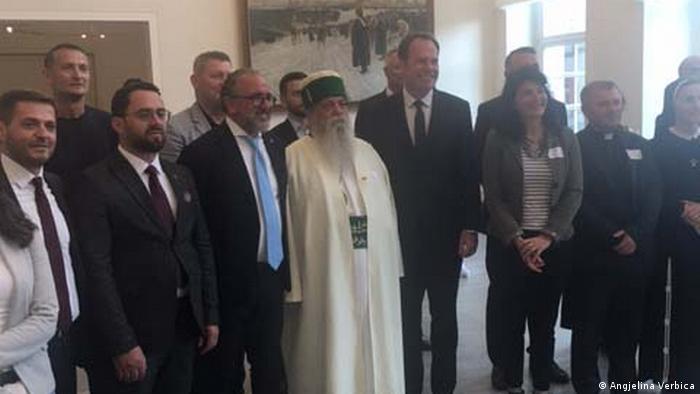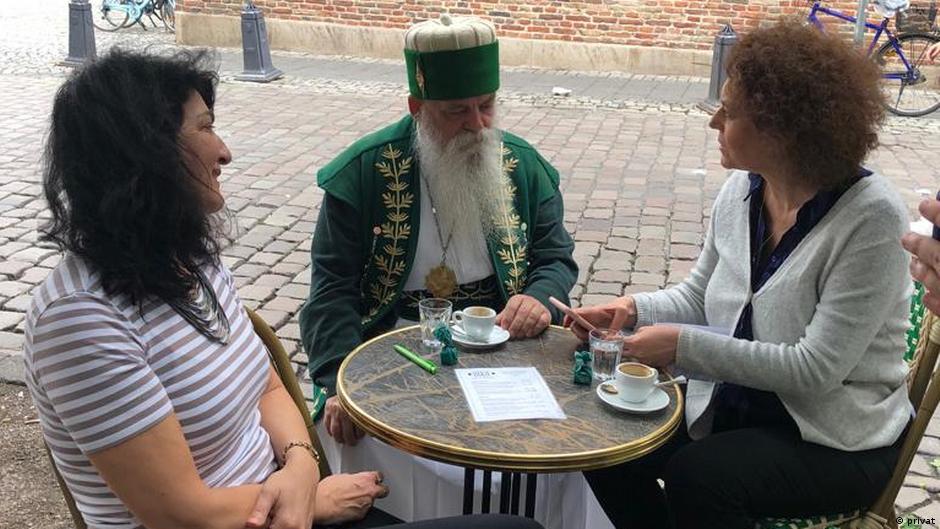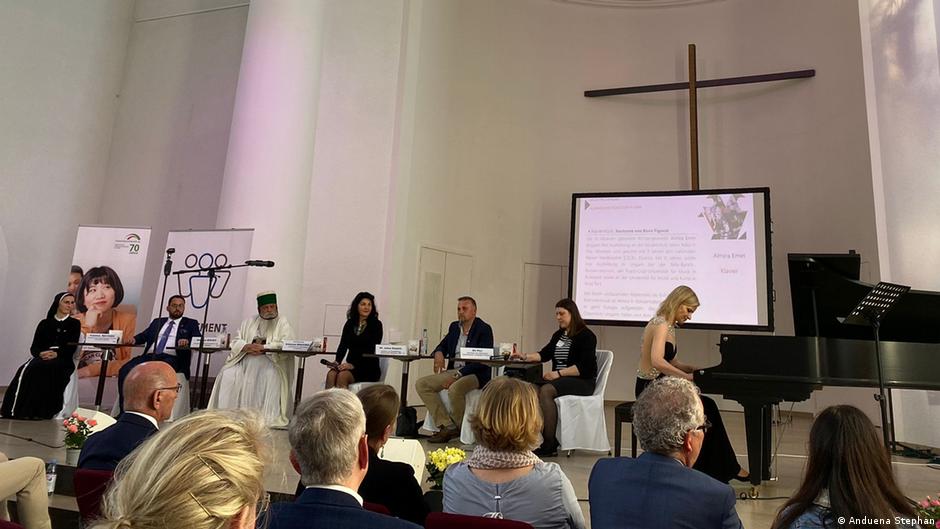
A delegation made up of representatives of five religious communities, with which the Albanian state has a cooperation agreement, stayed in NRW to convey to Germany the centuries-old tradition of religious harmony.
"Freedom of religion and belief is a practical reality in Albania and the world can learn a lot from the Albanian experience in respecting the freedom of thought, conscience, religion or belief and achieving religious harmony", affirms the United Nations special rapporteur on religion and faith, Ahmed Shaheed.
The echo of this virtue of the Albanian society has long gone far, and in the meantime it is known and appreciated in every corner of the world. To convey this added value in the German state of North Rhine-Westphalia (NRW) stayed there from May 13 to 16, a delegation made up of representatives of five religious communities, with which the Albanian state has a cooperation agreement, the Muslim community, the church autocephalous Orthodox and Catholic Churches, the world Bektashian Headquarter and the evangelical brotherhood.
Emphasizing the importance of the visit, the organizer of this event, the honorary consul of Albania in Germany (NRW), Anduena Stephan, says that "for the first time in the state of NRW between the mayors of the cities of Essen, Bocholt, Duisburg and of Düsseldorf, all taken together with an area that gathers about 4 million inhabitants, and a high concentration of the diaspora, the religious committees and the committee of cults of Albania had the opportunity to communicate about this Albanian added value, which we we have everyday between us, but that here is not something that is self-evident."
In NRW, with the highest population in Germany, since the time of industrialization, different cultures have met there, and then different religions since the arrival of the first guest workers from Turkey in the 60s. In a country with such demographic, cultural and religious diversity, where tolerance is proven, Albanian religious harmony is a welcome example.
At the reception in the city hall of the city of Düsseldorf, the mayor, Dr. Stephan Keller emphasizing the importance of freedom of religion, which in Germany is protected by the constitution as part of basic rights, said that people of all religions and beliefs can freely express their beliefs here. "A few days ago we celebrated the Christian holiday of Easter; Muslim believers celebrated Eid and Jewish believers celebrated Pentecost. Here in Düsseldorf we live this freedom and harmony in a free society, completely as the motto of your visit to Germany describes it".
On the occasion of the solemn mass for the 800th anniversary of the city of Bocholt, Grandfather Dedebaba Hajji Edmond Brahimaj had the opportunity to make a blessing for peace and harmony in the Albanian language, which was welcomed by the Christian faithful. Impressive for the Albanian delegation was the visit to the Merkezi mosque in the city of Duisburg, which has turned into an attraction as an object, where dialogue tables are held between all religious faiths. An example of how the Catholic, Protestant and Islamic communities coordinate work in the service of citizens.
In the symposium organized in the city of Essen, the Albanian delegation conveyed the example lived for centuries of the harmony of different faiths in one country. Explaining the functioning of the state-faith relationship in Albania, the chairman of the State Committee of Cults, Klodian Bulku, explained the independence of religious communities from the state, which are self-administered according to their principles, rules and canons. The Constitution of the Republic of Albania (Article 10:1) states that the state does not have an official religion and that it is neutral in matters of faith and conscience, recognizes the equality of religious communities and that the parties mutually respect each other's independence and cooperate for the good of each and everyone.
Tolerance, which is based more on dialogue
This experience of respect and cooperation was confirmed by Mrs. Efgjeni Pici, representative of Orthodox believers from the diaspora in the United Kingdom and Sister Fatmira Matoshi, representative of the Franciscan sisters of the Immaculate Virgin in Albania. Bringing her experience, sister Fatmira said that she is aware of the truths of the Catholic Church and that she respects the truths of the Islamic or Orthodox faith and believes that on these bases religious coexistence in Albania really works peacefully without any strain: "Religious tolerance goes beyond I'm good at my job and you're good at yours. It is a tolerance based more on dialogue. In dialogue we listen and speak, so it is a more conscious coexistence. The personal identity of any faith is not alienated, we are not dealing with the imposition of beliefs or the leveling of change Eve. But with an awareness that we know ourselves, we respect the other and religious coexistence is built on these bases", concludes Franciscan sister Fatmira Matoshi.
In Albania, the arrival of new faiths and religions has historically never been associated with conflict and religious war. Thanks to this tolerance of the Albanian people, all the different communities have lived together in complete harmony and peace. The Chairman of the State Committee of Cults, Klodian Bulku, explained that even in moments of interreligious disputes, intellectual clergy and believers have been able to resolve them peacefully, citing as an example the example of Father Gjergj Fishta, who in the 30s of the century past, in a moment of tension between Muslims and Catholics, he connected the bell tower of the Catholic church and the minaret of the mosque in the city of Shkodra with a twinkling cord of electric lights, which meant peace between faiths and the extinguishing of disputes.
As the common national feeling has traditionally stood above the differences of faith, inter-religious tolerance has withstood all the turbulent moments that the country has gone through. Dedebaba Hajji Edmond Brahimaj, the head of the Bektashian World Headquarter, says that no threat has been able to overshadow tolerance. People in Albania live and value understanding.
"There is no danger that tolerance will be damaged" he asserts "because Albanians are one and being one despite the fact that different currents come to Albania, as they have, but they have not found that warm bed to act. This is a merit of all of us and of the entire Albanian nation. Together we have preserved this miracle of the Albanians."
The mayor dr. Stephan Keller and Sister Fatmira Matoshi
Even for the representative of the Albanian Evangelical Brotherhood, Jeton Keqani, the interreligious feeling that Albanians have does not come from theology, but from the common feeling as a nation. "We do not know that religion has fought against religion among Albanians. It is not theology that keeps us in religious harmony, but it is the nation, brotherly love, as the Bible says, love the other as yourself".
The panorama of religious coexistence is not a facade, but reality, it is perhaps even more beautiful than it seems and we are comfortable in our work, adds Servet Gura, member of the State Committee of Cults, which covers relations with the Muslim community.
Taking into account the long time of denial of religion and the period of atheism in the communist regime in Albania, the symposium held in Essen also discussed whether the indifference to faith, resulting from the growth of generations without religious education, has influenced the increase of tolerance. Servet Gura thinks that this is not the fact that he played that role, which is attributed to him. "I do not think that the religious harmony in Albania is a product of the religious indifference of the Albanians, or of the atheism imposed by the communist regime, because it is an inter-religious coexistence inherited between generations. Over the years, the religious clergy in Albania have worked to build this harmony and we continue to work, with the aim of leaving a legacy for future generations."


